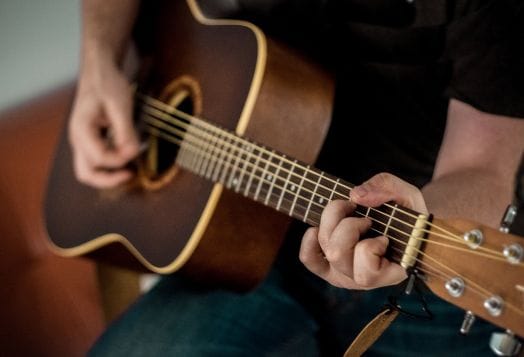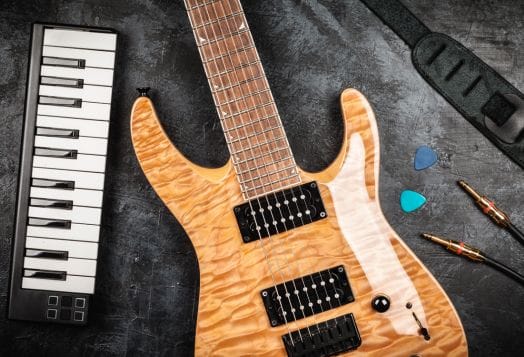Remember humming along to the guitar strums of Give Me Some Sunshine or feeling the fire of Sadda Haq? Maybe the keyboard soundscapes of Kal Ho Na Ho left you mesmerised. Now, you’re at a crossroads: guitar vs. keyboard. Which instrument should you learn first? Both unlock nostalgia and creativity, letting you relive musical magic while crafting your own melodies. The right choice awaits.

Chords or Keys? Finding Your Musical Match
Choosing your first instrument is a big decision. You want something that's fun to play, fits your musical tastes, and isn't too frustrating to learn. This article aims to help you navigate this musical crossroads and confidently choose the right instrument for your journey. We will explore the pros and cons of each, considering everything from ease of learning to musical styles, guiding you toward the perfect instrument to ignite your passion.
Quiz: 1. Do you love Bollywood acoustic songs like Pehli Nazar Mein and Jeene Laga Hoon? A) Yes! B) Not really 2. Which song would you rather play an unplugged version of? A) Tera Ban Jaunga B) Agar tum Saath Ho 3. Do you prefer carrying your instrument around easily? A) Yes, I want to play anywhere. B) No, I don’t mind a setup. If you got mostly A’s, the guitar might be your perfect fit. If you picked mostly B’s, the keyboard is calling you. |
Pros of learning the guitar first
Here’s why the guitar might be the perfect fit for you:
1. Portability and accessibility
Unlike a keyboard, a guitar is easy to carry around. Whether you’re jamming at a campfire, performing on the street, or simply practising in your room, you don’t need a power source or extra equipment. Just grab your guitar and play.
2. Perfect for songwriters
Learning a guitar often revolves around chords. This provides a fantastic foundation in music theory as you quickly grasp the relationships between notes and how they form harmonies. If you dream of writing your own songs, the guitar is an excellent companion. Many of the greatest songwriters, like Bob Dylan, Taylor Swift and Ed Sheeran, craft their songs on a guitar because it allows for spontaneous creativity.
3. Instant gratification
Is it easy to learn the guitar? Well, that depends on your commitment. The learning curve for guitar can be steep at first (those sore fingers are real), but once you master a few basic chords, you can start playing songs almost immediately. It’s a great motivator to keep going.
Beginner-friendly guitar songs to try: Gulabi Aankhen by Mohammad Rafi, Wonderwall by Oasis.

Cons of learning the guitar first
Learning guitar for beginners can be an incredibly rewarding journey. With just a few simple chords, you can strum your way through popular songs and impress your friends. But, while the rewards are immense, it's important to be aware of the potential challenges before you dive in.
1. Finger pain and calluses
The steel strings can be harsh on beginners' fingers. It takes weeks, sometimes months, to develop the toughness needed to play comfortably, which can be discouraging for some learners.
2. Difficult chord transitions
Barre chords like the dreaded F major can make beginners want to quit. But don’t worry, start with songs that use simple open chords, like Kabira or Kun Faya Kun, and you’ll gradually build the dexterity needed for more complex playing.
3. Requires tuning & maintenance
Unlike a keyboard, which stays in tune indefinitely, a guitar needs regular tuning and occasional string replacement, which can be difficult for beginners with limited knowledge of strings and chords.
Pros of learning the keyboard first
Let's explore the compelling reasons why learning a keyboard first might just be the perfect launchpad for your musical aspirations.
1. A gateway to music theory
If you want to really understand how music works, the keyboard is a fantastic choice. The layout of the keys makes it easier to visualise scales, chords, and progressions, giving you a strong theoretical background.
2. Easier on the fingers
Unlike the guitar, which requires calluses and finger strength, playing the keyboard is relatively painless for beginners. This makes it a great choice for younger learners or those who don’t want to deal with the initial discomfort of guitar strings.
3. Ideal for producing & composing
If you have dreams of making your own beats, composing film scores like Hans Zimmer, or diving into electronic music, learning the keyboard will be a huge asset. Most digital music production software is designed with keyboard input in mind.
Beginner-friendly keyboard songs to try: Tera Ban Jaunga from Kabir Singh, Agar Tum Saath Ho from Tamasha.

Cons of learning the keyboard first
Starting with the keyboard isn't always guaranteed to be a smooth and effortless experience. Let's take a look at the potential hurdles you might encounter.
1. Slower song learning curve
Playing the guitar lets beginners start with simple strumming patterns and basic chords, making it easy to play recognisable songs early on. On the other hand, the keyboard demands precise hand coordination and a foundational grasp of music theory before one can fluently perform complete pieces. This structured learning approach may feel slower but ultimately builds a stronger understanding of musical composition.
2. Expensive
A good keyboard setup can be costlier than a beginner’s guitar. Digital keyboards with weighted keys, sustain pedals, and sound features can be a significant investment.
3. Space hogger
A guitar can be hung on a wall or tucked into a corner, making it ideal for those with limited room. A keyboard setup, however, requires a dedicated area, especially if it includes a stand, pedals, and additional accessories. Finding space for a full-size keyboard can be challenging in compact living situations, and moving it around isn't as effortless as grabbing a guitar. For musicians with tight space constraints, this can be a significant factor in their decision-making process.
Comparing the Two Head-to-Head
So, which instrument is right for you? Let's break down the key differences:
1. Learning curve comparison
Both instruments have their challenges. The guitar can be physically demanding at first, while the keyboard might require a steeper initial dive into music theory. However, both are equally rewarding with consistent practice. It's not necessarily easy, but it's certainly achievable with dedication.
2. Musical style and genre considerations
Your musical preferences should play a big role in your decision. If you love rock, pop, or folk, the guitar is a natural fit. If you're more interested in classical, jazz, electronic music, or pop with a strong emphasis on keyboard or synth sounds, the keyboard might be a better choice.
3. Cost and equipment
Generally, beginner keyboards can be slightly costlier than guitars. However, ongoing costs like strings and tuning for guitars versus potential software or sound library purchases for keyboards should be considered.
4. Social and community aspects
Both instruments offer opportunities for social interaction. Guitar communities, both online and offline, are often built around a shared love for specific genres, artists, or playing styles. Open mics, guitar circles, and casual jam sessions provide opportunities to connect with other guitarists, share tips, learn new songs, and simply enjoy making music together.
Keyboard players often find their niche in bands, providing essential harmonic and melodic support. The versatility of the keyboard also opens doors to collaboration with musicians from diverse backgrounds, including vocalists, guitarists, drummers, and even electronic music producers.
The Music Journey Begins

There's no right or wrong answer when it comes to choosing between guitar and keyboard. The best instrument is the one that inspires you, motivates you to play and promotes relaxation. So, take some time, consider your options, and then take the plunge! Your musical journey awaits.
Disclaimer: This information provided is intended for general informational purposes only. It is not a substitute for professional advice or guidance. For personalised recommendations or specific concerns, please consult a certified professional.




